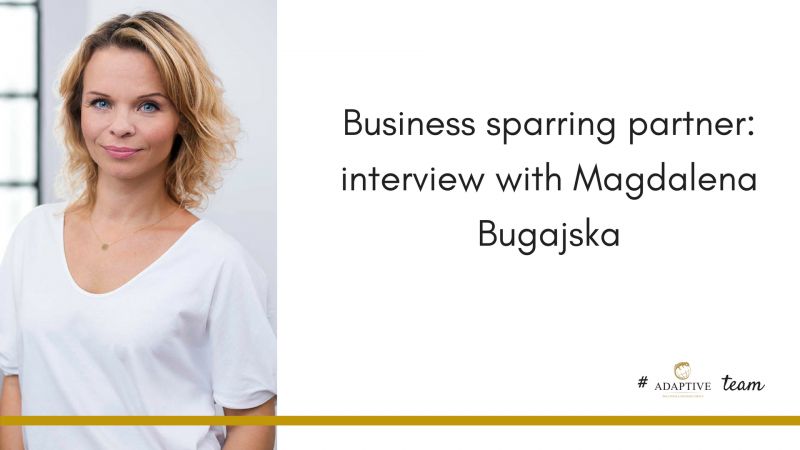
Posted on: Jul 23, 2018
If you are tired of typical interviews, this is something for you. About challenges, ideal business relation and travelling- feel welcomed to read the interview with Magdalena Bugajska, Program Manager in Adaptive Group. I must say this conversation got me thinking…
Irmina Liczbik: What is your position and responsibilities in Adaptive Group?
Magdalena Bugajska: I’m a Senior Consultant and Program/Project Manager. As for my responsibilities, I mostly take care of program management, transformation and design. Currently, I’m engaged in two projects. In the meantime, I can also have some “extras” which I receive from my bosses.
Can you tell me an example of such unexpected extra activity?
I had two “extras” recently. As you know, we are currently working on Adaptive’s new website. I’m responsible for reviewing the content, bringing the structure and order, to make sure that there is a consistency between chapters. Also, I get additional tasks, like being asked for an inspirational idea and preparation of a presentation. These “extras” are, in fact, my favourites.
You said you are currently taking care of two projects. Can you elaborate on the details?
On the first one I’ve been working for the last three years. It’s about the implementation of a global platform to reconcile the travel expenses for one of our clients globally, across 70+ countries worldwide in Europe, Canada, US and South America, and Far East, like Japan, China or Singapore. I have a dual role: Project Manager and Change Manager. For EUCAN region I’m also responsible for Business Case delivery including Request for Proposal (RFP) process to select scanning and archiving supplier.
The second project, which I have entered recently, is about the optimization of the payroll and HR processes for one of our clients on the Polish market. Here, I have a role of Project Manager working with a team of specialists. The client has set up Shared Service Center (SSC) around 2 years back and now it’s time for transformation. SSC Payroll & HR teams serve over five thousand employees in Poland. It’s quite interesting.
What is the most important for you in such projects? Do you have any particular way of working?
Each project is different, so each one should be treated individually. If you ask me for a methodology I follow, in most of the cases it’s the PRINCE 2 with all its key elements: business case, planning, risk and change management, and progress monitoring. However, every client usually has its own idea, so you need to adapt to the requirements.
On top of that, no matter which methodology is used, I do have my recipe of course and it usually works. To start with, you need to listen to your client and what is even more important, to confirm whether you understand the client’s expectations as he/she does. Once you are assured, you start cooperation based on the end to end responsibility. This way you give a confidence to the client that you are on top of the situation, and your client feels comfortable. That’s the goal!
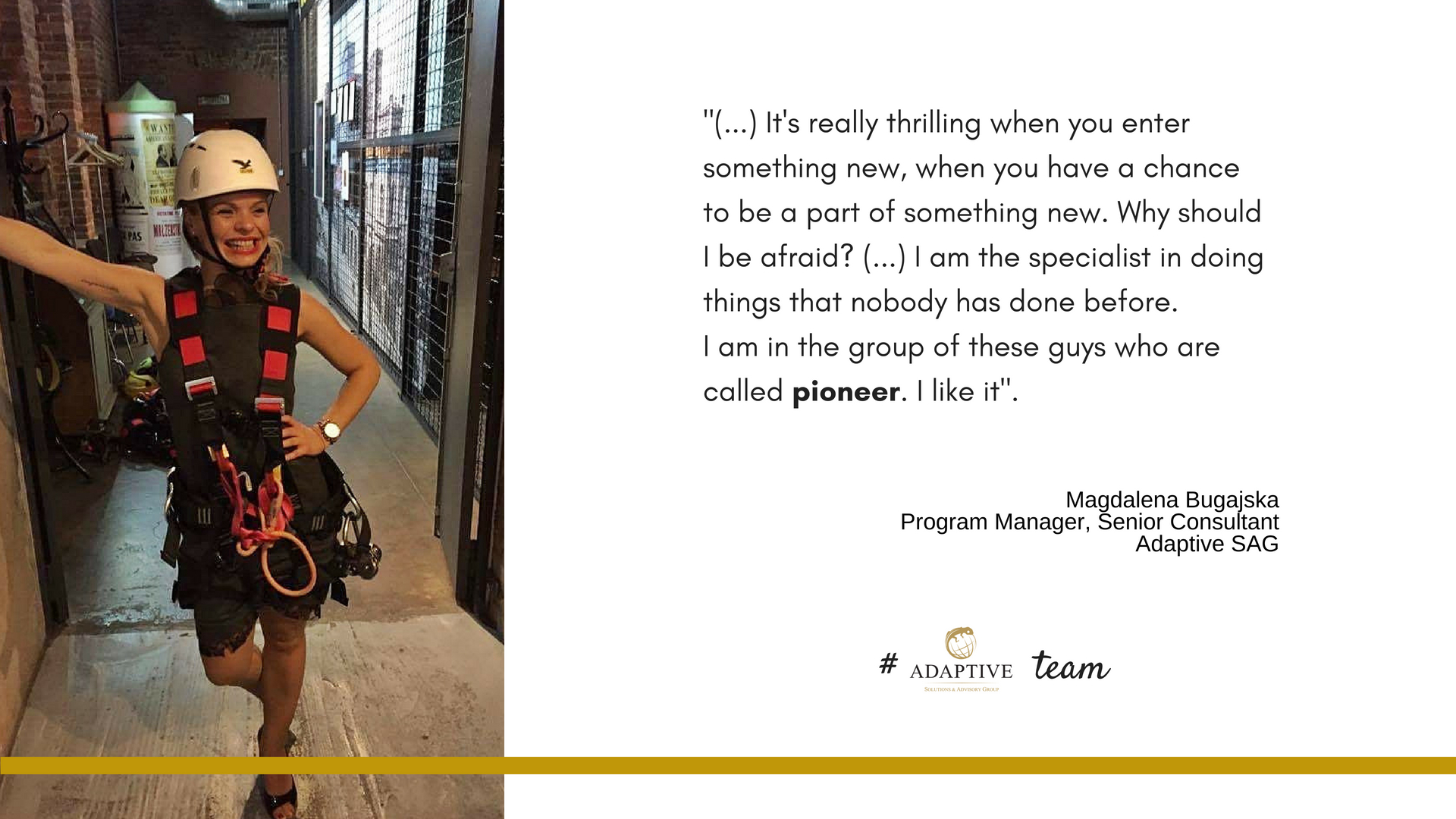
What is the most challenging in your job?
Hmm… If you could please define what do you mean by challenge?
Sometimes you have a part of the job you are not sure of but, after some time, it won’t be a problem if it comes out the reality is different than you thought. However, there are some challenges that you really need to make sure you handle them properly.
Challenge is a natural environment in this business and that is why I asked you about the definition. Every person understands challenge differently. Also for me, five years back, a challenge meant something completely different than today.
For me, challenge is something positive and usual. During eleven years of experience in this business, I have learnt that challenge or escalation or issue or change- at the end, it all means the same. This is a natural part of our day to day business. What I prefer is to concentrate on the problem solving. If there is a challenge/issue/escalation, what I always do is to look for solutions and plan A, B, or C. What is the risk, pros and cons, behind each of them. Once you see them written you have the full picture in front of you and it’s a lot easier to take a decision. That’s what every client appreciates- you discuss the whole “package” and it’s the client who makes the final decision. What’s even more appreciated, is when you are one or two steps ahead. Nobody likes to be surprised, especially the client. I was hired as PM and it’s my job to spot the challenge and bring it to the plate of my client together with possible solutions.
So, for now, if you force me to find something… Working in a team or with a person who is not able to learn may be problematic. If you work with somebody, brainstorm, try and there is no result, no self-reflection to the feedback. For me, that would be a challenge, something that needs to be approached differently.
How do you deal with such a person/team?
At first, I give it a try. I don’t take things for granted. Everyone has a story, so like in one of the songs – “walk a mile in my shoes” – I try to understand what is behind. That helps me to know whether I will be able to deal with that. If it does not help, I am professional, I concentrate on the task. It’s not impossible but it absorbs more energy. However, business is business, we are at work, so we need to deliver what we were hired for. No mercy (laughs).
No mercy (laughs). It seems the best option: conversation instead of hiding anything because otherwise you may have further negative effects.
Yes, the transparency always wins. Even if such value is not always recognized.
What inspires/drives you?
What I am constantly passionate about is… life. As simple as that. For me, the essential part of it is work with people and different cultures. This is what the job has been giving me for the last years- the diversity. When you learn about the cultures and habits of different groups, you understand them, you respect them.
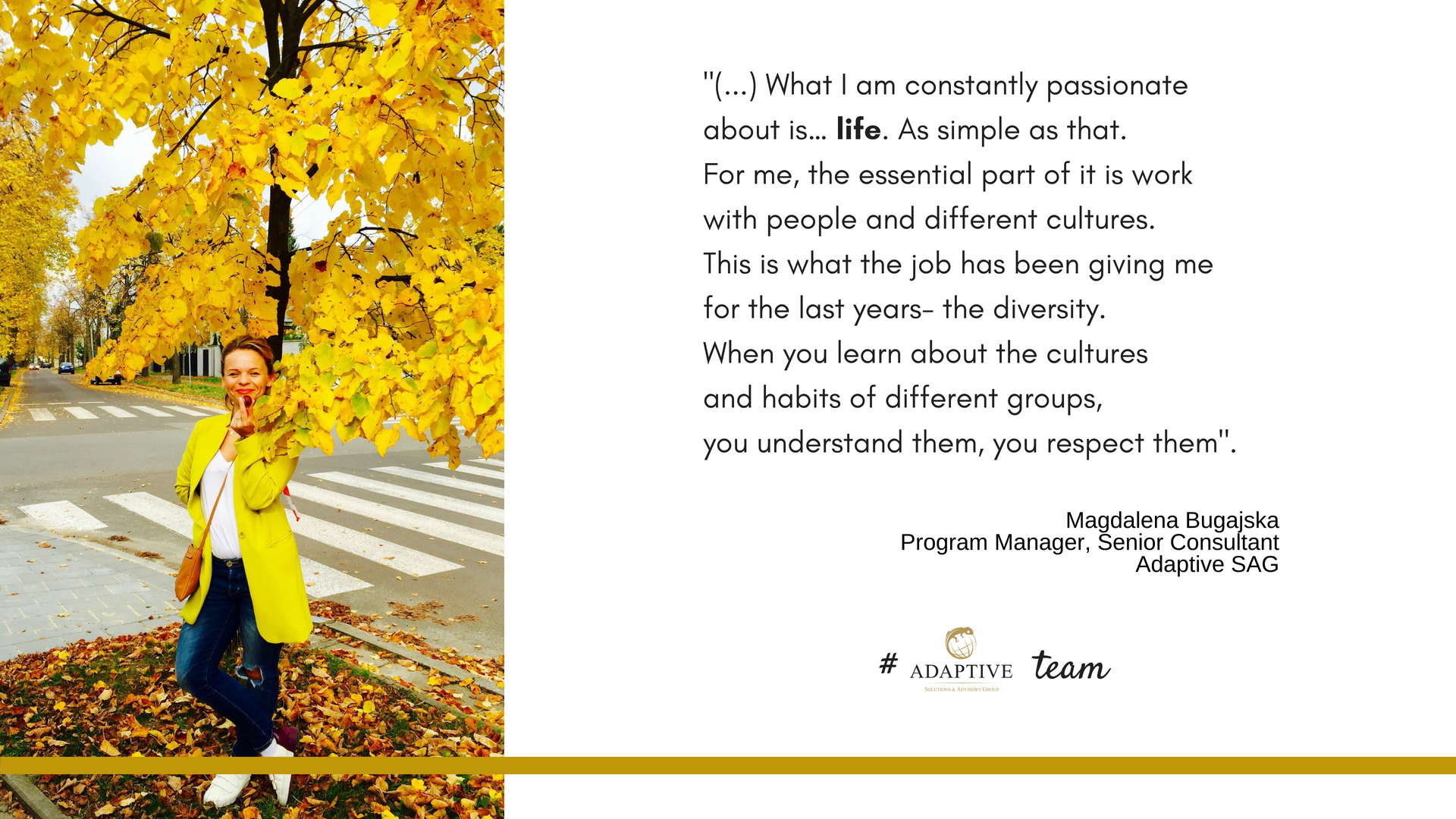
It’s also definitely about “feeding” yourself. What does it mean to me? Firstly, I try to surround myself with people who are open-minded. I follow the rule “try to avoid negative people, they have a problem to every solution” (laughs). Secondly: travelling and nature. You are smiling so you know what I mean. It’s about getting to new places, tasting new flavors, discovering new lands- that gives you a broader perspective.
There is a nice old story from the Indian culture about the truth inside us. Did you know that there are two wolves in each one of us? One wolf is the positive one- open, cheerful, excited about getting up in the morning or do new things, makes sure you believe in yourself; and there is the other one which constantly tells you: “it’s not enough, don’t do it, stay home, don’t move, step back”. The question is which of the wolves is more in you and the answer is: the one that you feed. My idea is to feed the good one and this is the story about me being passionate about life.
You mentioned travelling. A part of your job is to travel across different countries in order to visit the clients’ companies. Was there any business trip during which you were surprised by something?
It’s always a surprise! (laughs). Well, the biggest one was incredible India with a bunch of contradictions, poverty and richness just around the corner. Once you see that, you immediately start appreciating the effort done by your coworkers to make it to come to work every day. After being there you are never the same anymore.
Traveling was always a big part of my business life. The main rule is “when in Rome, do as the Romans do” and you will survive! Usually, when on a business trip, you mostly discover the route between the airport or train station to the office or hotel, that’s the reality. However, with only a small effort you can take every advantage and experience the local culture, cuisine and habits, to check on the country stereotypes. That makes you rich! And you never realize when you start bowing in Japan, or riding a bike in the Netherlands, which I bought from one of my Indian colleagues while being on the 6-month assignment in the Philips HQ. Or you are getting an Italian accent while speaking English or even Polish, also being more expressive will all the gesticulation (laughs). In December, you go to the beach and enjoy the ocean’s breeze and watch the surfers (Oeiras in Portugal). Even bringing a sombrero from Mexico, you don’t really need in Poland does not surprise you anymore…
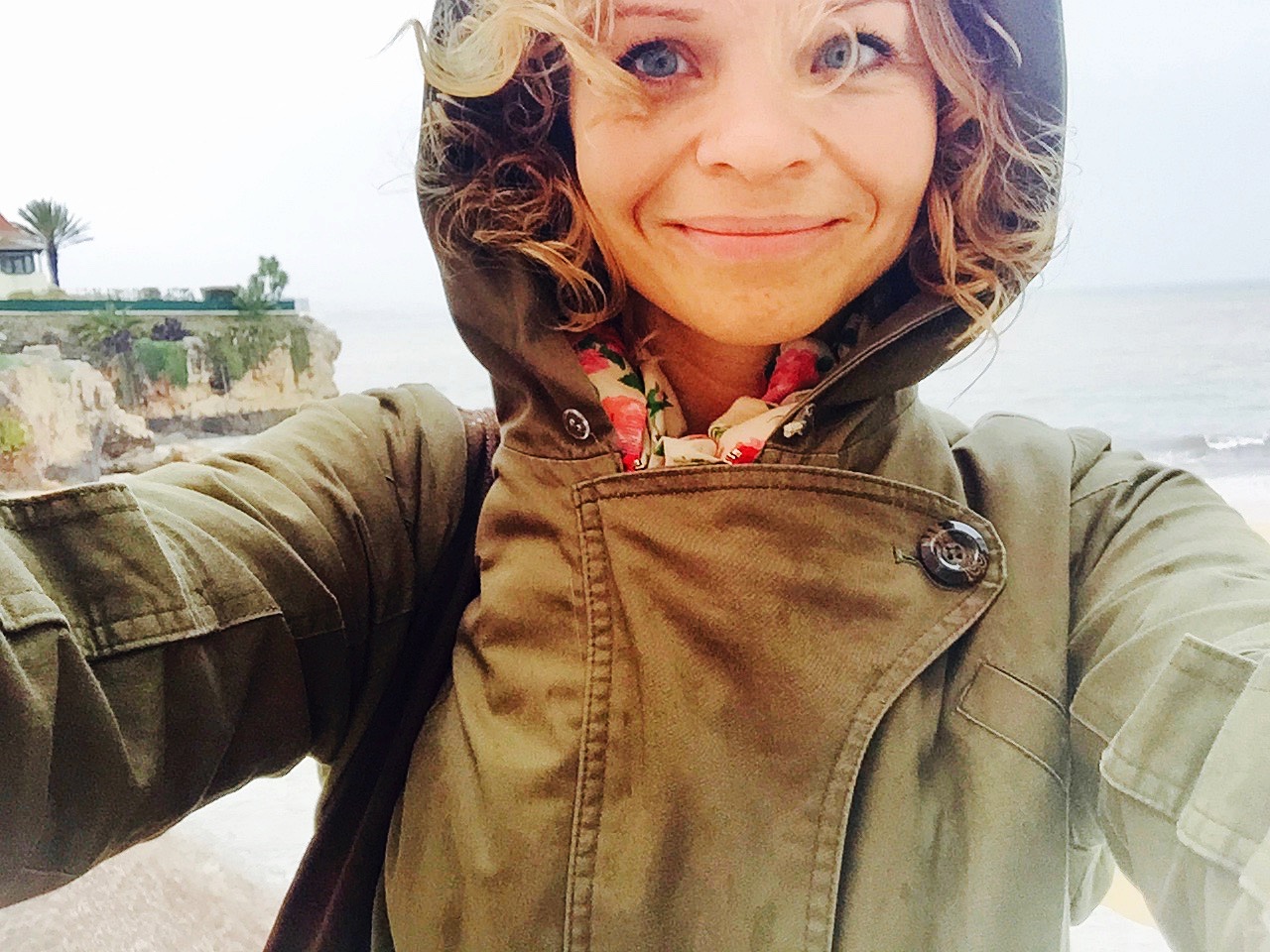
Learnings? The smaller country, the more attention is needed (Portugal). If there is silence on the other side of the phone, it doesn’t always mean they are avoiding you. Most probably your counterpart is … thinking. So don’t start yelling, definitely it won’t help to reach a consensus (India, Japan). It’s very useful to know all the nuances between the nations, while working on the program and grouping the countries, you might gain plenty of time and have smoother deployment (e.g. countries of former USSR). Always document every consensus made with your stakeholders, so nobody forgets what’s been agreed (especially with Italians, Spanish, French or… Polish). Asian teams always come to the meeting early, while the Latin or southern European ones are usually late. It’s really interesting to handle with all this diversity while being the PMO, for example.
The best thing is that I’m still in touch with most of the people I had a chance to interact the other day, who were excellent hosts. Thanks to them I could experience their local flavors and bring it all with me to my home country.
Let’s change the topic a little bit. In your opinion, what makes a good Program Manager?
What I strongly believe in is that a good Program Manager is a person who is on top of the situation; has the ability to listen and understands the expectations very well. It’s also somebody who recognizes the main stakeholders, knows whether the goals within organization are consistent.
I’ve been working mostly in transformation programs- it’s not an easy task. Usually, it’s a decision from the top management with a global impact. When we talk about cost reduction, usually we are 100% sure it comes along with people reduction, so it’s crucial to identify the main stakeholders from the business side and who will be influenced by the change. When you are the main performer, you are in between and there are different forces and expectations. The main strength is your main business counterpart, who must be a decision maker- you need the full alignment on the goal because this is a dynamic environment and the goal may change just over the night.
To sum up, the good Program Manager should: listen, understand, ask questions.
Be curious.
Yes, which also means to question the status quo. Sometimes questions are helpful to verify or adjust the goal. You need to be ready for something which hasn’t been taken into consideration before.
Not sticking to the assumptions but when you see there is a better solution…
Indeed, what is very useful, to test (check) a solution on a smaller population, which is usually done with a pilot. Be selective while choosing a pilot group. You need a cooperative team, who will be an advocate of the proposed change. You simply need success and good learnings, before you kick-off the full program. That always supports the change because what you will get later on with the program deployment is always a strong resistance from the business, people managing their daily job, in many cases within the labor unions like Germans or French. There are many factors which should be taken into consideration, and the pilot gives you the chance to adjust the direction and assumptions of the design phase for the whole program before the full speed.
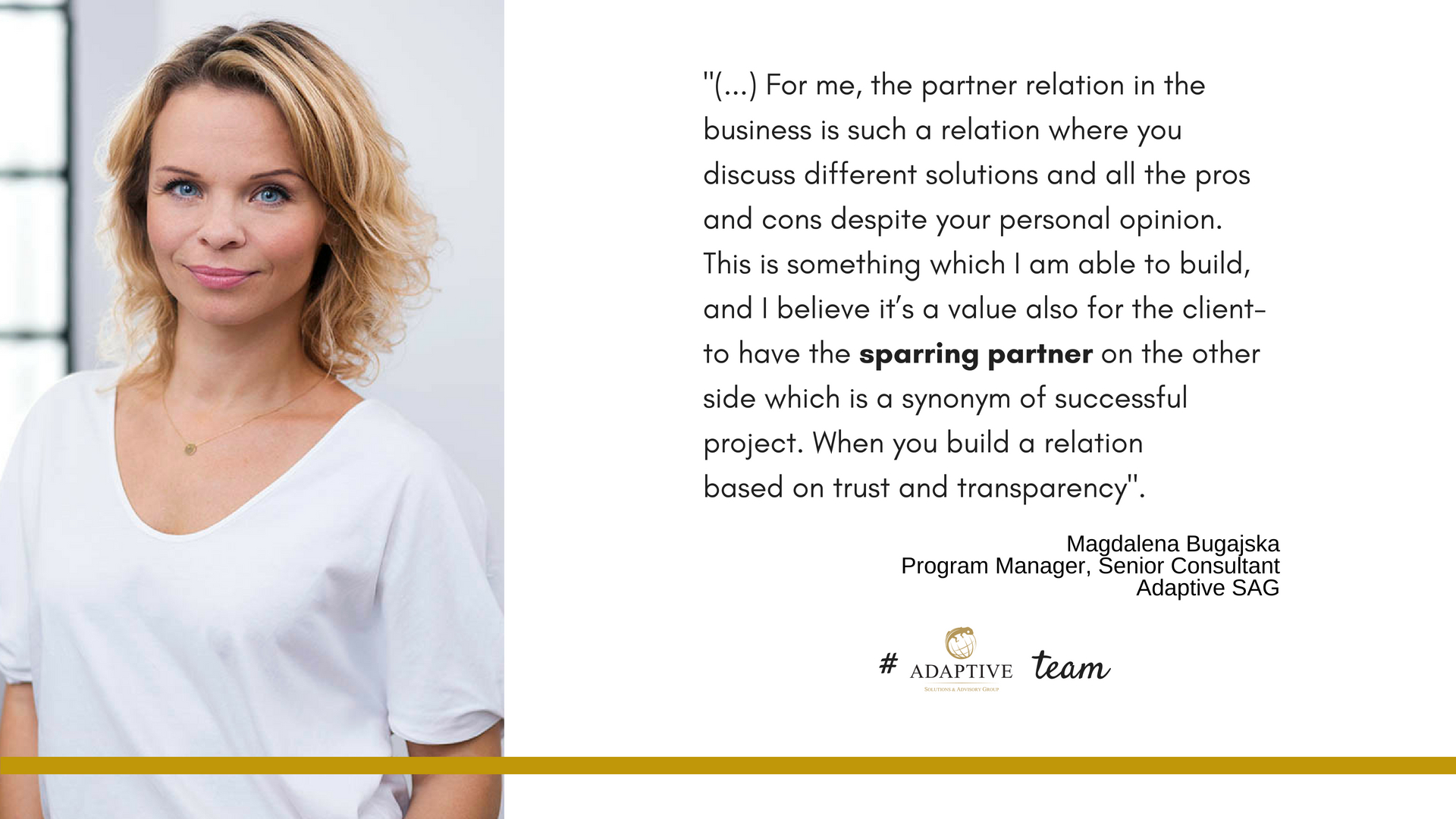
Tell me more about your experience and its impact on you today.
I have about 18 years of professional experience. I started working already during my studies. I used to work as a regular accountant in Polish company. Then I moved into the SSC/BPO sector and it’s been already 11 years. Every position involved working with people.
The job which has had the biggest impact on who I am today? I think three years while being an independent auditor in Sox Compliance Unit. It was all about being on the way, travelling from location to location and auditing- proposing solutions where it was necessary but also getting tough when it comes to solving problems on the way and still be professional.
Then I moved to the transition teams but that was a different profile because we transferred knowledge from various locations to the SSC here in Lodz, Poland. I started as a leader – being responsible for Turkey, Italy and Portugal – then I was a manager. I was growing in that role thanks to my managers who believed in me.
I believe, all of that was a very good workout for the most significant program I took part in. It was a transformation program with a movement of around 1700 people worldwide. My responsibilities included working on the design, assumptions, how the new operating model should look like – at that time working together with the client, in full confidentiality, in a very small team. Then I was responsible for the pilots in Europe, so I had a great chance to verify the assumptions. Of course, you hear questions like “what an idiot designed that?” and you are like “ok…”, just smiling because it’s crucial to verify and bring the feedback back to the design team. Once the pilots were completed, we started with the full program. At every stage of the program, there was a component of team building. Here you learn that you need to have people with different skillset and qualifications, whether this is transition, stabilization or operations.
When we started the full transition, I was a part of the project management office (PMO) and we were managing everything within the program together with the progress monitoring and the transformations. It was EMEA region, Asia, both Americas, in total 60+ countries. In parallel we’d been transferring and structuring the processes, transforming everything into the desired shape. The final step was to accommodate the processes and people into already working operational teams – and that was a challenge! I was responsible for the EMEA region with my managers reporting to me, and we managed! At that time, I have learnt that escalation is nothing that should increase your heart rate, it’s a regular task to be handled. I also have understood that the most important thing for my counterparties and the main Program Manager on the client side is to be a partner, the sparring partner in the discussion. What is more, I have learnt that none of us likes to be surprised and definitely client doesn’t want to be surprised. My job was to be one or two steps ahead and to inform my client about the “surprise” together with couple of options to choose from. This is the experience which had the biggest impact on me.
You have asked about the impact on me today. What I have observed together with the colleagues, comparing to other business environments, for us every new situation or change is just a part of our regular life. We are used to such and we feel like kids in a candy store when confronted with surprises. I like that feeling (laughs).
What is your proudest achievement?
What I am really proud of is the ability to build a partnership, which means a professional business relationship with a client. When you build a relation based on trust and transparency. For me, the partner relation in the business is such a relation where you discuss different solutions and all the pros and cons despite your personal opinion. This is something which I am able to build, and I believe it’s the value also for the client- to have the sparring partner on the other side which is a synonym of successful project.
What is your superpower?
I am the specialist in doing things that nobody has done before. I am in the group of these guys who are called “pioneer”. I like it.
Are you never afraid of anything?
Well, no, as I said, it’s really thrilling when you enter something new, when you have a chance to be a part of something new. Why should I be afraid?
Well, usually when people are confronted with something new they are scared.
Well “to be confronted” has a pejorative flavor, I’d go for “being introduced” to the new situation, meaning getting familiarized yourself with all the details and then, based on the outcome, to decide whether I am in or out. Now it doesn’t sound that scary anymore, right? (laughs). You know, there may be a unique chance to be a part of something new. The big project I have mentioned today- it was my first one as such. Yet, the influence you have, makes it worth it. In such situation you are the captain.
However, what is extremely important to remember while you enter a new project, you can’t do it on your own. You need the best team with you, diversified one. There is a very useful classification of team roles by Dr Belbin. You don’t need 3 designers (plants) in one team because they will be constantly competing on the best idea, and who’s the best one, and you will never leave the design phase. You need somebody with the vision, but also one who dares to challenge the idea. You also need specialists who will deliver, monitor, coordinate or who will be passionate about all the details, to put your process into perfect order at the end. This is for me the key to success: know whom you are going to need the moment you recognize the goal and the phases of a project. Once you have this knowledge, invite proper people.
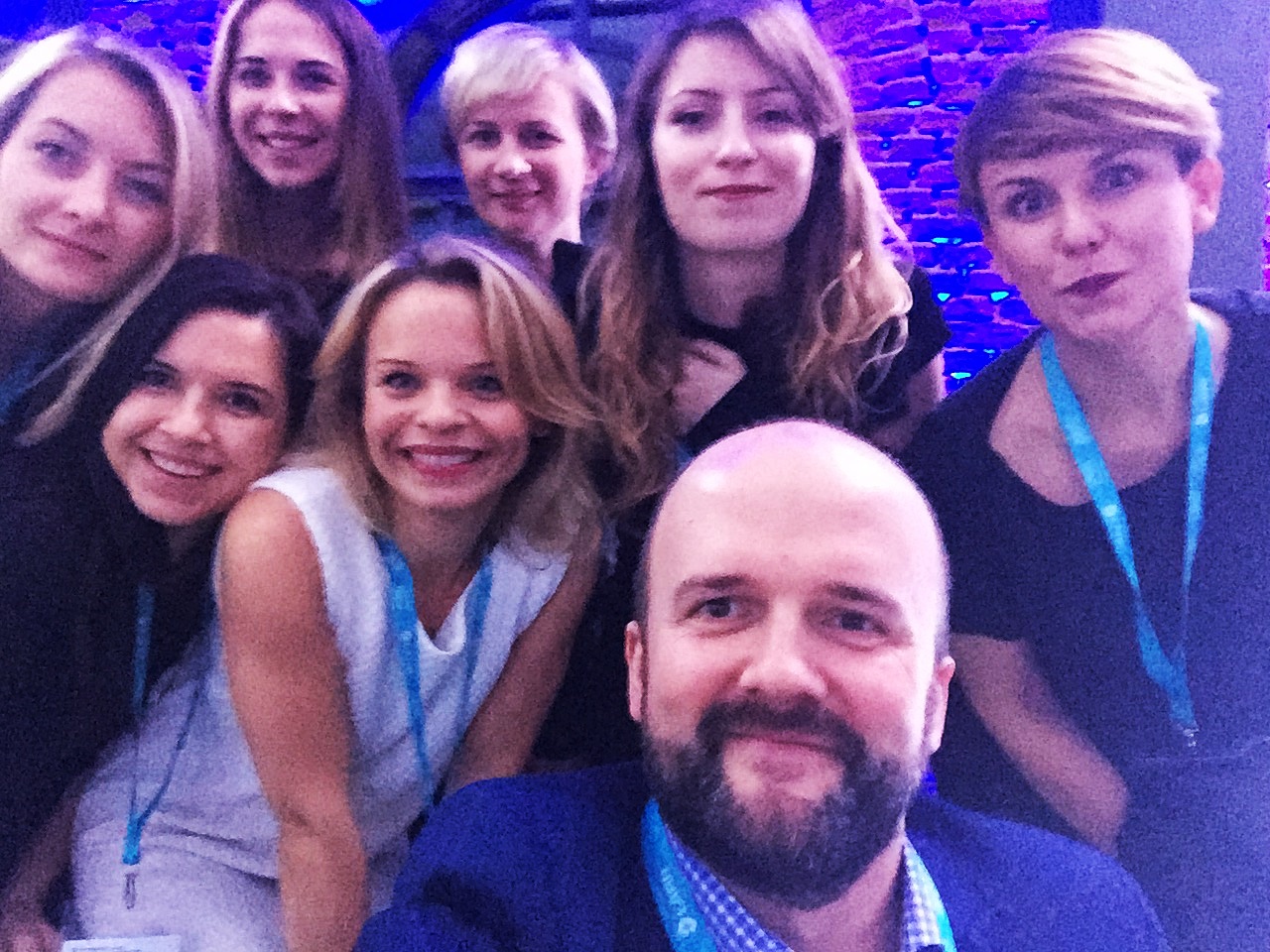
If you were to give just one piece of advice to those who are not as positive as you. What should they do to feel better and be braver?
The question is: what are you afraid of? Firstly, I would like to understand what is the biggest fear, only then to advise. There are different reasons standing behind fear: you feel your competences aren’t enough to handle the project or you know the client is very demanding, and you don’t have a proper team with you. It’s important to find out why the person feels uncertain. It’s a leader role and responsibility to equip the team with the relevant tools that will fit to the upcoming challenge.
You just try to be rational. Not base your opinion on feelings…
“Gut feelings” are always there, right? However, there are always some rationales behind. Writing them down helps to make yourself fully aware of the situation. For me, the excel file is always helpful. I started even to plan holidays, my apartment renovation, everything in excel file. It’s working!
Excel world (laughs)
Exactly (laughs) and it’s really user friendly and brings you visibility.
Let’s talk about your current professional situation. Why have you chosen Adaptive Group?
I was the first employee of Adaptive Group, actually. Just after the bosses and our brilliant assistant (note: now junior consultant) Kasia. Why I’ve joined Adaptive? I knew the inventors of the concept and I simply trusted the concept. It was a startup at that time and I believed in it. I think I was right.
We’re growing as a company and what is unique for Adaptive is that we’re a team of experts but still each of us can keep here one’s identity. You can just be yourself even though you need to be adaptive. What is more, we’re adaptive but what we have in common is that we’re very well organized. There are people who need to be monitored at work, which isn’t the case for us. I believe it’s the value we share.
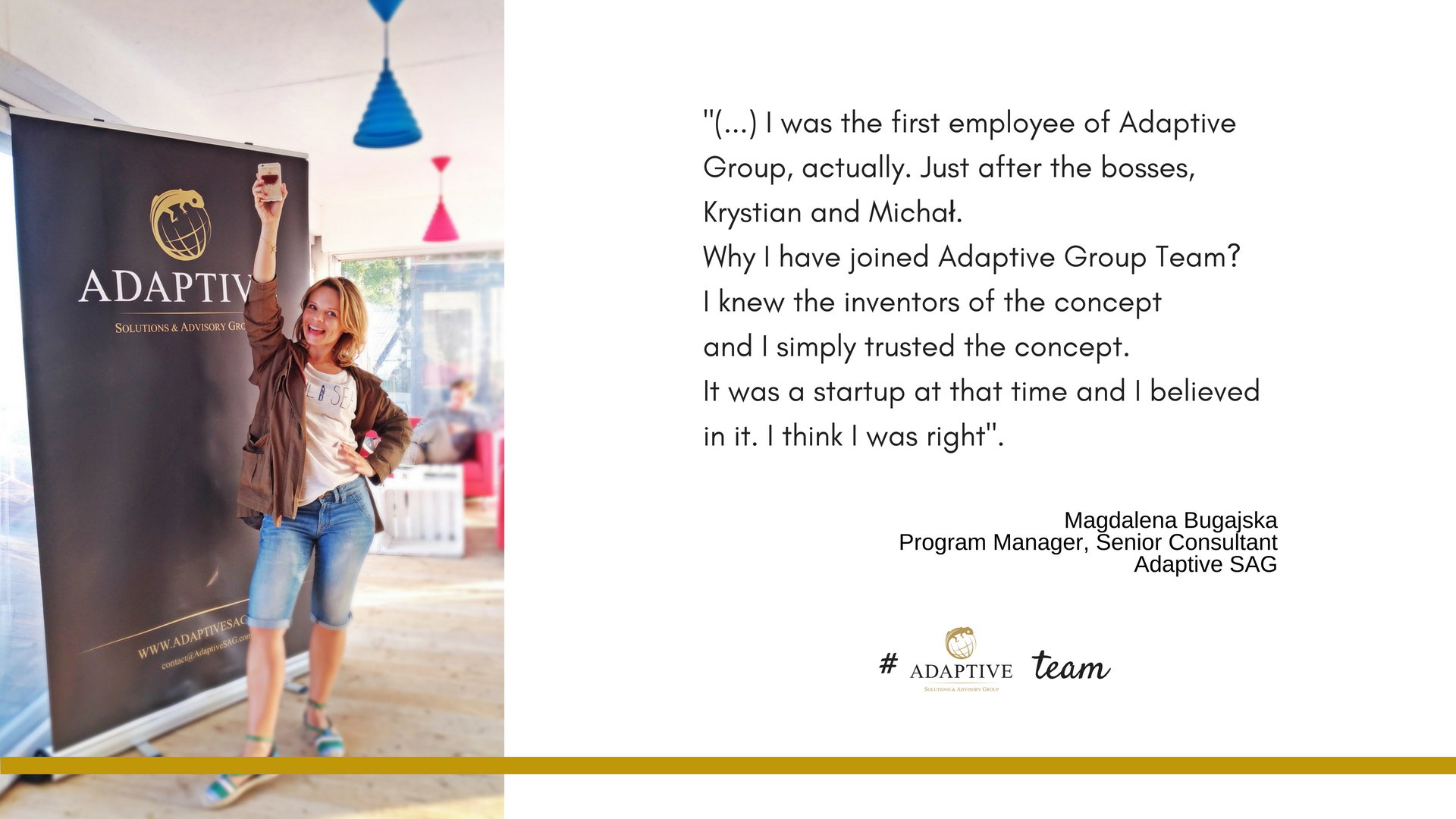
You value working in Adaptive Group because you can be yourself. How about your clients’ companies? In such big organizations, is it hard to keep your personality? What is your observation?
I’ve been working in many clients’ environments for some time and it differs. Even within one company, depending on the size, you may have several departments and each department may be different than the other. To me everything is connected to the chief. In Polish we say “jaki pan, taki kram” (the house shows the owner) so there is a personality and this person gathers people around himself/herself.
Of course, if you work in a structured company, you have rules to follow and you need to adjust but I don’t think it’s wrong. Everything is up to your personality.
So how you treat the rules: whether you treat them as a possibility to achieve more or something that limits you?
I believe people always follow their bosses. They work for the boss, not for the company. As a result, if the personality of the boss and the way of working attitude suits you, you are just there. You develop, you have opportunities, you feel good and you have achievements. You feel important and encouraged to add value. In my opinion, this is what brings people to the stage “yes, I want to do it”.
Having a real leader vs. having somebody who is in the position of a leader but is not a real leader.
Yeah, now you sound like Simon Sinek (laughs). That guy is amazing!
You had a chance to listen to him during ABSL…
When he was asked about his “why?” and he started talking, you had no reason not to trust him. I fully felt with his answer. He said he wants to be an inspiration for the people so when they wake up in the morning they feel excited to go to work then they come back home to see family and friends and go to bed with the feeling of fulfillment. When I heard this, I thought “this is life I would like to have”. I buy this “why”.
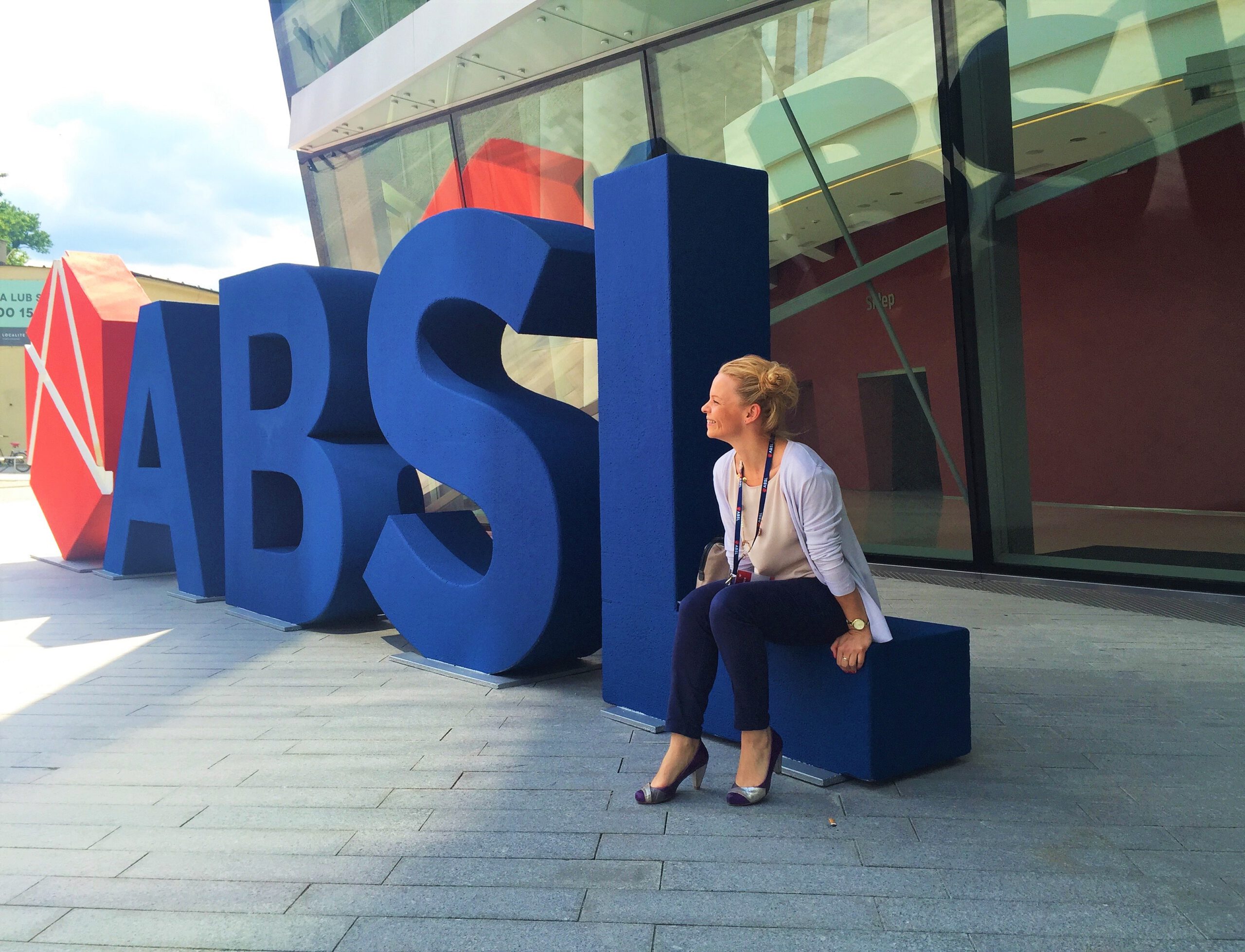
It brings us to another question: whom you would like to meet? I understand Simon is one of the people you would like to have personal conversation with but maybe there is somebody else?
Yes, Simon Sinek would be one of them. I’m thinking about other people … From the women world, I would love to meet in person: Krystyna Janda (famous Polish actress) and Hanna Zdanowska (mayor of the city of Lodz, Poland). From the men world I thought about Donald Tusk (Polish former prime minister, now the president of the European Council) and Robert Biedroń (politician, mayor of city Słupsk). Why? All of them are very charismatic people, with this energy to make an impact and difference to this world. There is a consistency in what they think, what they say and how they act, they are engaged and professional and, what is really important, they respect people around them. Their energy is like an infection and simply empowers you to believe you also can make a difference.
To conclude: how do you imagine yourself in 5, 10 years?
Well, in 5, 10 years I would be in my mid or late forties so a perfect age I believe. I really hope to be in a good shape then (laughs).
All of us hope so, it’s a good goal (laughs).
For me, forties are a synonym for maturity, experience, knowledge of what you like and what you don’t like and the feeling that there is still a lot to go. You can do new things and develop- take up a new language to learn, new activity to learn or maybe change your profession. This age has a lot of opportunities for human being. The comfort level you have with the feeling that you know what you are good at sounds amazing. Maybe that will sound cliché but for me it’s very important to keep the work-life balance: have a successful, happy, healthy private life and professional- doing good money on the other side. This is my goal.
Sometimes it’s better to dream about things which are at first sight very simple because on the other side it’s very hard to achieve such balance…
I think that the key is to trust yourself and to respect yourself. This is for me the way to achieve it.
Kind of being positively selfish.
Yes, and also not naive. Follow your heart, but take your brain with you (laughs).
Thank you very much for your time. I keep my fingers crossed for your goals.
Thank you.
